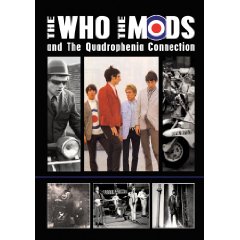
Sexy Intellectual
Are you so music obsessed that the Classic Album Series DVDs are obligatory viewing? Yeah, me too. Those type of programs, which dissect a classic release (i.e. The Who’s Who’s Next ) and go into deep detail with the musicians and production team on its creation, never get boring, even if it’s an album that’s not high on my list of all-time favorites. Now, if that viewing fascinates you then The Who, The Mods and The Quadrophenia Connection should be a welcomed addition to your video library. Its level of interest rates higher based on your level of fandom. Casual follower who bought a copy of one of the Who’s best-of compilations? Don’t bother. Got all the albums including solo releases and bought the books concentrating on the band? Yep, this is just right for you.
The documentary takes devotees further into the world of the Mod movement and its lasting marriage to the Who’s career via the band adopting the look of the Mods as a calculated career shift to Townsend’s angst-ridden rock opera about that era, Quadrophenia. Now, it is a negative that such an undertaking does not include interviews – new or old – with any of the members of the Who. To get Townshend or Roger Daltrey’s views on the situation would, obviously, add a higher degree of depth.
Surprisingly, although the doc suffers from their absence, it still manages to work as an illuminating addition to the Quadrophenia album. The main reason for this can be attributed to the DVD’s focus. It begins and ends with the Mods — explained here by the nearly dozen interview subjects who were there at the beginning or its post- Quadrophenia resurgence or its current wave as a reaction to the trad jazz of the ‘50s then a fashion movement coupled with a love for American rhythm & blues. These participants have a greater understanding of the relevance of Quadrophenia, and how its release in 1973 as an album, and then in 1979 as a film reflected that period of time while simultaneously giving voice to youthful rebellion and confusion. It’s all those elements mixed together that are touched upon here. DJ and Acid Jazz records owner Eddie Pillar voices the ups-and-downs of Mod life best with the comment, “That’s the trouble with youth culture. That is how it always dies. It’s killed by success.”
Included are valuable performance clips featuring Georgie Fame, Booker T & the MGs, the High Numbers (early Who) plus an account of the album’s four vinyl sides. With the Who, and to a lesser extent the Small Faces and the Kinks, Mods found bands that blended the culture and new blues-based rock sounds of the early ‘60s. But only Townshend embraced the scene at the time and then chronicled those moments in a manner that’s as complicated as the four-sided mental state of the album’s main character – corresponding to the band members’ personalities – yet make the result vital enough to draw in listeners from around the world.



No Comments comments associated with this post